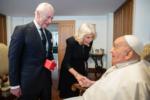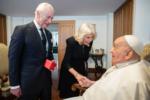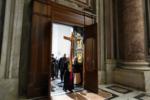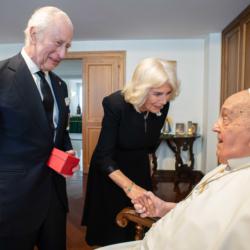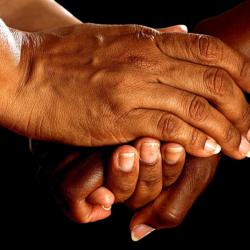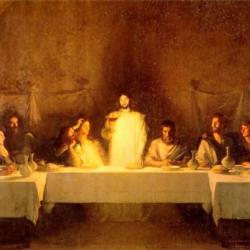Poll shows majority support for religious freedom in marriage debate
WASHINGTON (CNS) -- A recent Associated Press poll shows that while a plurality of Americans support the legalization of same-sex marriage, a majority believe that the religious liberty of those who object to such marriages, including owners of wedding-related businesses, should still be respected.
The poll, which was conducted between Jan. 1 and Feb. 2, shows that 44 percent of Americans favor legalization of same-sex marriage, 39 percent oppose it and 15 percent "neither favor nor oppose" legalization of such marriages.
Respondents also were asked this question: "In states where same-sex couples can be married legally, do you think that wedding-related businesses with religious objections should be allowed to refuse service to same-sex couples, or not?" Fifty-seven percent of those polled said that "they should be allowed to refuse service," and only 39 percent said "no, they should not be allowed" to do so. Four percent refused to respond.
The poll's results on legalizing same-sex marriage show "that support for the truth about marriage is too low and, thus, we all must renew our efforts at explaining what marriage is and why marriage matters," said Ryan T. Anderson, William E. Simon fellow in religion and a free society at the Heritage Foundation.
"It's not that people have heard the case for marriage and rejected it -- it is just that they have never heard it," he told Catholic News Service.
"The majority of Americans rightly recognize that everyone should be free from government penalties for believing and acting on the belief that marriage is the union of husband and wife," Anderson said. "We must continue to defend our freedoms to speak and act in the public square in accord with the truth about marriage."
The Catholic Church upholds marriage as a union between one man and one woman and teaches that any sexual activity outside of marriage is sinful. The church also teaches that homosexual attraction itself is not sinful and that homosexual people "must be accepted with respect, compassion and sensitivity."
The issue of whether a business owner has the right to refuse services to a same-sex couple came to the forefront of public discussion over two years ago when the owners of the Sweet Cakes by Melissa bakery in Gresham, Oregon, were threatened with fines of up to $150,000 for refusing to sell a wedding cake to a same-sex couple because of the owners' religious beliefs.
Refusing the sale violated the Oregon Equality Act of 2007, which imposed a nondiscrimination order that prohibited businesses from refusing services based on a patron's sexual orientation or gender identity.
Following two years of subsequent lawsuits and the closing of their business, the former owners of Sweet Cakes by Melissa were found guilty of discrimination, meaning they will face up to the maximum $150,000 fine.
The situation of Sweet Cakes illustrates the dilemma of Catholic employers who oppose providing certain services on the grounds that, according to church teaching, it would be a form of "material cooperation" with evil.
"The question of whether baking a cake for a same-sex wedding -- to use an example in the news recently -- constitutes a material -- and therefore, culpable -- cooperation (with) evil would depend on several circumstances, including intent," said Stephen P. White, a fellow of Catholic studies at the Ethics and Public Policy Center. "But even if such a case constituted remote cooperation -- which might be permissible -- there is no requirement to cooperate against the dictates of conscience. Just the opposite, in fact."
"Thankfully," said White, "most Americans understand that the burden of proof falls on those who would force their fellow citizens to violate their religious beliefs, not on those whose rights of conscience are protected by common sense, common decency, and, as it so happens, the Constitution.
In Oklahoma, lawmakers Feb. 12 approved a bill to protect clergy who refuse to preside over a same-sex wedding or to recognize a same-sex marriage. It passed by an 88-7 vote in the House of Representatives and now goes to the state Senate for consideration.
The measure would protect members of the clergy against same-sex marriage from being sued over their stance.
In Washington, U.S. Rep. Randy Weber and U.S. Sen. Ted Cruz, both Texas Republicans, introduced the State Marriage Defense Act of 2015 in their respective chambers. It would allow states to define marriage and block the federal government from imposing its definition of marriage on the states.
Archbishop Salvatore J. Cordileone of San Francisco, chairman of the U.S. bishops' Subcommittee for the Promotion and Defense of Marriage, sent letters to both lawmakers strongly supporting the measure.
Same-sex marriage is legal in 37 states and the District of Columbia. Eleven of those states legalized such unions either through either popular vote (three) or the state legislature (eight). For the rest, same-sex marriage has been legalized by court decisions. Thirteen states ban same-sex marriage -- one by constitutional amendment and 12 by constitutional amendment and state law.
In April the Supreme Court will hear oral arguments in four same-sex marriages cases it agreed to take -- from Tennessee, Michigan, Kentucky and Ohio. The court is consolidating them into one hearing, tackling the questions of whether the 14th Amendment requires states to allow such marriages and whether it requires them to recognize same-sex marriages licensed in other states.
The AP poll, which was conducted by Gfk Public Affairs, showed an even split among Americans about whether the high court should rule that same-sex marriage must be legal nationwide -- 48 percent said it should, but 48 percent said it should not.
The margin of error for the poll was plus or minus 3.5 percentage points.

